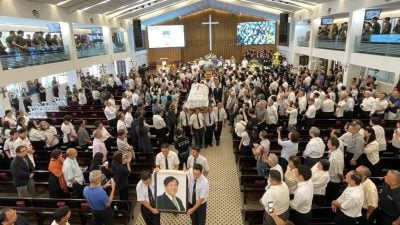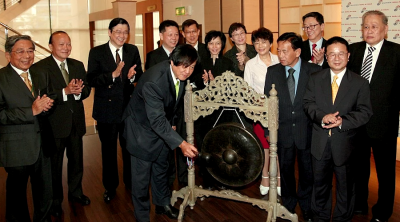
By Boo Cheng Hau
A medical college mate who is also one of the public health decision-makers for the Caribbean islands, described the novel coronavirus as "the most politicized virus in history."
When I was on a vacation in Xian, China in late-January, he issued a warning in our social media group of college mates but most felt the outbreak was only erupting in China's Wuhan and was too far from them to take heed of the warning seriously.
That public health college mate of mine refused to take things easily and continued to study the coronavirus outbreaks in China and the rest of Asia, and issued warnings to various Caribbean authorities to adopt the necessary measures to tackle an imminent public health disaster.
Under the advice of the WHO, the island nations rejected the berthing of any cruise ships, and around the time the MCO was declared in Malaysia, many Caribbean nations had declared a state of emergency and curfew.
I arrived in Xian just as Wuhan was on its second day of lockdown. According to the local media reports, there were about a dozen of confirmed COVID-19 cases in Xian, all linked to the city of Wuhan. All the sightseeing spots in Xian were closed to tourists, and the security personnel on duty at the entrance looked tensed up as he strived to stop people from getting near the entrance. Everyone in the street was donning a face mask and healthcare personnel were seen sterilizing public washrooms. Trucks were seen spraying disinfectants along the major streets, and the entire city was eerily quiet and deserted.
The police refused to reveal how serious the outbreak actually was and accurate information was very hard to come by.
Visiting China's ancient capital without getting to see the Qin dynasty terracotta warriors and many other ruins was downright disappointing, but at least we witnessed how the country was dealing with a war-like crisis.
As a major power of this world, China's political values and system have come under tremendous impact because of the virus. Li Wenliang, the whistleblowing ophthalmologist from Wuhan instantly alerted his colleagues of the return of a SARS-like virus and wanted them to take precautions. Unfortunately, the Wuhan authorities refused to conduct further investigations on the claim and instead forced him to sign a letter of admonition. As a result, China missed the golden opportunity to prevent the further spread of the virus to become a global pandemic. It was a shame that such a clampdown on professional advice has to a certain extent impacted the Chinese communist party's administrative and policy-making systems.
It was highly unprofessional for the political interests of bureaucrats to take precedence over professional knowhow. Even though the central government has subsequently taken actions against the local officials involved, the weaknesses of the country's autocratic regime were unreservedly exposed by the viral outbreak, in addition to lack of corresponding political democratization as the country is making impressive progress in economic liberalization, as well as absence of free flow of fundamental information within the bureaucratic system.
This outbreak has also highlighted the need for the CCP to overhaul its bureaucratic system and gradually democratize its political system.
In this era of information overload, CCP will have to decisively draw up its long-term reform roadmap and objective, failing which the country's intrinsic weaknesses may further widen the wealth gap, giving rise to steeped social unrest and political rivalry.
Although CCP has later resolved to make amends in a bid to reverse the dramatic rise in infection cases in the country—which it rightly deserves commendations for its superior mobilization and organization powers—it should have taken cue from how Britain resolutely handled the mad cow disease crisis by strictly banning the trading of wild animals after the 2003 SARS epidemic.
After this catastrophic lesson, I am sure the Chinese will learn to manage a crisis in a more scientific and rational manner in order to repeat the past mistakes.
In the meantime, US president Donald Trump has excessively politicized and emotionalized the coronavirus outbreak, causing the country to register more than 600,000 cases (as of April 15) or about 30% of global total, in a span of just two months, with a mortality rate in excess of 4%.
The viral outbreak has also shaken America's capitalist-centric healthcare system, with hospital beds, ICU wards and ventilators excessively overwhelmed. Eight of its more conservative states have refused to implement lockdowns. The situation is even more severe than in Italy, China or Spain.
The CDC has advised the public to put on face masks when they go out, but the president has openly expressed his reluctance to wear one. His arrogance has shown that the United States really lacks a leader who is rational, resolute and intelligent enough to beat a much more cunning new virus.
Italy, Spain and many other European countries have also encountered a crisis of near collapse of their healthcare and economic systems. The coronavirus has exposed the aged and rigid systems in both the US and EU while highlighting also the relatively transparent crisis handling capability and superior medical efficiency of Germany. In addition to strict quarantine policy, Germany has also developed speedy testing technologies. Although the country has seen a steep rise in the number of confirmed cases due to large scale testing capabilities, its mortality is only 2.64% against the global average of 6.34%. Other countries that have adopted a similar approach to tackle the virus boast relatively lower mortality rates, such as South Korea (2.12%) and Singapore (0.31%). This shows how important transparency on the part of policy-makers and daily adjustments to existing strategies based on facts and most updated data are in combating the virus.
Countries like Germany, South Korea and Singapore have got their testing equipment ready right at the early stage of their respective outbreaks in order to conduct massive tests on suspicious cases on a daily basis. South Korea has even offered free drive-through testing services for the public—including people not presenting any of the COVID-19 symptoms—with reports ready in a few hours. Such a measure has allowed the country to see drastically slowed down increase in new cases four days after reaching a peak at about 8,000 cases. This is what we in Malaysia should learn.
This also shows that democracy is not a failed system, but that data transparency comes much more important. The ability of decision-makers to have the most updated information in order to make the best ever decisions should help reinforce the public's faith in our democratic system.
Whether Malaysia can eventually contain the coronavirus outbreak will very much depend on our social awareness as well as the decision-making aptitude of our leaders based on the latest data and knowledge.
Our movement control order—a drastic move meant to contain the outbreak through minimizing social contacts—has been enacted against the backdrop of an uncontrollable outbreak and generally poor civic awareness. Without such a resolved decision, the spread of the virus will only accelerate and in the long run deal a much more disastrous blow on our economy.
The sly virus has upended the very much human-centric economic system. After this disastrous experience, hopefully human beings, including Malaysians, will rethink their survival strategies by taking the opportunity to shift our economic models from a labor-intensive one to tech-heavy new industry as we strive to break free from the middle-income trap.
Outdated mentality and strategies must be discarded. Save for the RM250 billion economic stimulus package and RM10 billion package to save the SMEs announced by the prime minister, which are meant to subsidize low-income individuals and help SMEs weather the income crisis and a moratorium on loan repayments, it appears that the government is more focused on direct cash distribution to the people. In its stead, the government should harness this unique opportunity to assist the local SMEs, and focus on employee upskilling and industrial transformation, while reducing our reliance on migrant workforce as we ready ourselves for a recession of global scale. We must also be prepared to absorb Malaysian workers retrenched by their foreign employers, expand our business aspect as well as production technologies.
The coronavirus has in two ways taught a valuable lesson to our nationalistic Malay political elites that the virus knows no racial and class differences. Everyone is equal in the eyes of the virus. In another aspect, the virus has also exposed the political elites' lack of knowledge, poor crisis management capability, lax attitude in pursuing technological excellence, and their failure to keep abreast of the latest developments of the virus' characteristics. Because of this, we have at one point become the Southeast Asian country with the largest number of positive COVID-19 cases.
The coronavirus pandemic has forced humankind to review their behaviors that go against the law of the nature while baffling the antiquated value system of humans' absolute powers in manipulating the Earth's vulnerable ecosystem.
We will very soon see the re-emergence of the value of global solidarity towards our equal coexistence as well as co-prosperity with all other living beings on this planet.
(Boo Cheng Hau is former assemblyman for Skudai.)
ADVERTISEMENT
ADVERTISEMENT


































